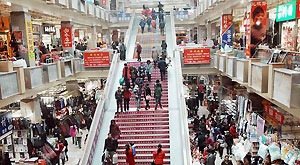Service sector growth slowest in 23 months
Shanghai Daily, February 4, 2014 Adjust font size:
Business activity in China’s service sector expanded in January at the slowest rate in 23 months due to the weak real estate sector.
The official non-manufacturing Purchasing Managers’ Index fell for the third straight month to 53.4 in January from 54.6 in December, the National Bureau of Statistics and China Federation of Logistics and Purchasing said yesterday.
This was the lowest reading since February 2012.
The bureau surveys 1,200 non-manufacturing enterprises in 27 industries to generate the monthly gauge where a reading above 50 indicates expansion.
“Indices for business activities and new orders in the real estate sector dropped significantly for two consecutive months and fell below 50 in January,” said Wu Wei, an analyst at the federation.
“The trend of the data showed that real estate activity was weak, indicating that the sector is undergoing a low season.”
But consumer consumption strengthened ahead of the Chinese New Year, bringing up retail business activity and new orders above 60 in January, Wu said.
A component index measuring business expectations for the next three months shed 0.6 points from December to 58.1, with restaurant and hotel sectors expecting a shrink in businesses.
The official services PMI comes in the wake of falling official and private manufacturing PMIs for last month.
The Purchasing Managers’ Index for the manufacturing sector dropped to a six-month low of 50.5 percent in January.
It indicated the lowest factory activity since August while marking the 16th straight month above the boom-bust line of 50, said a statement jointly released over the weekend by the National Bureau of Statistics and the China Federation of Logistics and Purchasing.
The HSBC/Markit China manufacturing PMI, measuring the private sector, also dipped to 49.5 in January from 50.5 in December, the first deterioration of operating conditions in the manufacturing sector since July.
China’s slowing growth is largely due to the country’s deepening reforms in economic restructuring, and it was good for China to address problems such as overcapacity and low investment efficiency, according to analysts.
The World Bank earlier lowered its expectation of China’s 2014 economic growth to 7.7 percent from the previous 8 percent, reflecting deleveraging and less reliance on policy-induced investment.
China is to forge ahead with reforms this year while maintaining stable economic growth by sticking to a proactive fiscal policy and a prudent monetary policy, the government decided at the Central Economic Work Conference which was held last month.


